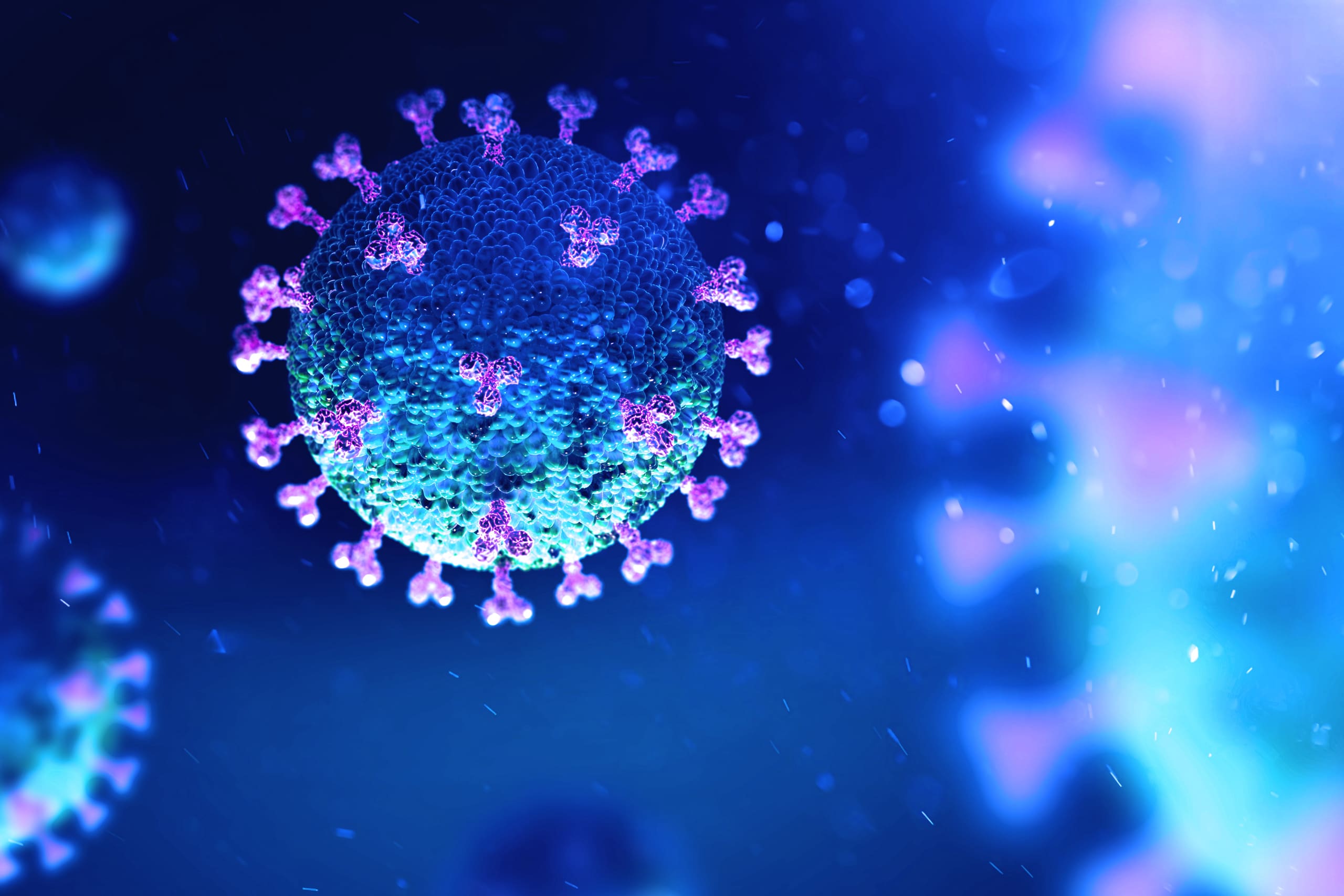Ask Our Experts
The latest COVID-19 developments

COVID-19 FAQs
At PHM, our team of PhD-led research experts continuously monitor the latest news, research, and developments for new insights on the COVID-19 pandemic to improve the health and safety of our clients. Here’s the latest:
Is the Delta variant more transmissible than other strains?
The Delta variant has been shown to spread at a faster rate1 than other known SARS-CoV-2 variants and is much more infectious than the Alpha variant. Studies suggest that key genetic changes, such as the L452R mutation, may enhance the ability of the virus to infect human cells. The Delta variant replicates more efficiently in the body, leading to a viral load that can be ~1000 fold higher than that observed with previous variants. The higher viral load in the respiratory tract increases the chances of the infected individual “shedding” the virus and infecting others.
Are the vaccines effective against the Delta variant?
The current vaccines appear to be somewhat less effective against preventing infection from Deltacompared to other variants, but they remain highly protective against hospitalization.2 During the current wave of COVID-19 infections fueled by the Delta variant, it is important to remain vigilant and take precautions to avoid contracting the SARS-CoV-2 virus. Even vaccinated individuals should avoid crowded spaces, wear masks indoors, quarantine and test if in close contact with a COVID-19 positive individual and consider receiving monoclonal antibody treatment if exposed and at increased risk of serious disease.
How common are breakthrough infections?
Infection with SARS-CoV-2 is possible after vaccination. Vaccines work to provide a state of readiness to fend off an infection but do not prevent an infection from occurring. This readiness can be degraded as the result of waning immunity from the vaccine over time and the impact of variants, such as the highly contagious Delta variant. Notably, COVID-19 vaccine efficacy against severe disease, hospitalization, and death remains remarkably high, as evidenced by both clinical trials and real-world data, even when efficacy against preventing infection wanes. Once infected, both vaccinated and unvaccinated individuals may carry similar viral loads and both can spread the virus to others when at peak virus levels. However, unvaccinated people are much more likely to be symptomatic and contagious for a sustained period of time. Vaccinated individuals are more likely to clear the virus quickly reducing the time that they can infect others. That said, it is still important for vaccinated people to remain vigilant, as they are significantly protected against, but not entirely immune to, infection and transmission
What are the most effective COVID-19 treatments available today?
There have been some exciting developments in recent months on treatment for COVID-19. One class of treatments, called monoclonal antibodies, has been shown to reduce the risk of hospitalization or death from COVID-19 by 70-87%. Three similar monoclonal antibody treatments, developed by Regeneron, Eli Lilly, and GlaxoSmithKline, have received Emergency Use Approval (EUA) from the FDA for treatment of COVID-19 in people early on in infection (within 7-10 days of symptom onset or a positive COVID-19 test) and at risk for developing severe disease. The Regeneron and Eli Lilly monoclonal antibodies have also received EUA to prevent COVID-19 in people who have been exposed and are at risk for developing severe disease; these treatments reduce the risk of symptomatic infection by 72-81%. Finally, on October 1, 2021, Merck announced that its oral antiviral drug molnupiravir reduced the risk of severe COVID-19 by ~50%. Merck is preparing to submit an application for EUA of molnupiravir in the coming weeks.
During the current wave of COVID-19 infections fueled by the Delta variant, it is important to remain vigilant and take precautions to avoid contracting the SARS-CoV-2 virus. Even vaccinated individuals should avoid crowded spaces, wear masks indoors, quarantine and test if in close contact with a COVID-19 positive individual and consider receiving monoclonal antibody treatment if exposed and at increased risk of serious disease.
What is a booster shot and who can (and should) get one?
A booster shot is an additional dose of a vaccine given to “boost” immunity achieved from a previous vaccination regimen and is typically given once immunity from the previous regimen begins to wane. A booster shot can also be designed to provide additional protection against emerging viral variants. Many routine vaccines, such as influenza, tetanus, and diphtheria, require multiple doses to achieve optimal immunity.
On August 12, 2021, the U.S. Food and Drug Administration (FDA) approved an additional (third) dose of the mRNA vaccines for certain immunocompromised individuals, and this guidance applies to BOTH the Moderna and Pfizer/BioNTech vaccines. For these individuals, the third dose should be administered at least 28 days following the initial two-dose regimen of the same vaccine. It is rare for the FDA to issue broad statements that cover multiple products at once; this decision was made to protect potentially vulnerable individuals. Given the breadth and urgency of the COVID-19 pandemic, the FDA has made, and is expected to continue to make, regulatory decisions that apply to multiple vaccines, particularly where those vaccines are similar in terms of underlying technology, safety, and efficacy.
On September 22, the FDA further authorized a third dose of the Pfizer/BioNTech vaccine for individuals who received the Pfizer/BioNTech vaccine for their initial regimen, and who are either 65 years of age or older, or who are 18-64 year of age and are at high risk of developing severe COVID-19 or at high risk of exposure to COVID-19 due to their occupation, such as healthcare workers, first responders, teachers, etc. The third dose is authorized to be administered at least six months after the initial two-dose regimen.
Both Moderna and Johnson & Johnson have recently released data in support of adding booster shots to their vaccine regimens as well. The U.S. FDA Vaccines is set to review booster data from both companies in mid-October. While several other countries have done so, the FDA is not currently authorizing individuals to mix-and-match different vaccines for initial vaccinations, third shots or boosters.
Are COVID-19 infections increasing in children?
During the Delta surge, infection rates disproportionately increased in children compared to adults. According to the CDC, hospitalization rates among children and adolescents rose nearly five-fold. Hospitalization rates were also 10 times higher in unvaccinated adolescents than in those fully vaccinated. This was anticipated as the vaccinations were initially tested and rolled out for high risk and older age groups, leaving the younger ages more vulnerable until more safety and efficacy data is available.
What is the current state of the COVID-19 vaccine for children?
COVID-19 vaccination for children is an area of intense ongoing clinical evaluation. At the present time, the Pfizer/BioNTech mRNA vaccine, now named Comirnaty, is the only vaccine available to adolescents, having received Emergency Use Approval (EUA) by the FDA on May 10, 2021 for children 12 -15 years of age and above. Moderna submitted its data for children 12 years and up on June 10, 2021 and is awaiting review by the FDA. No COVID-19 vaccines have been authorized in the U.S. for children 11 years of age and below, though Pfizer/BioNTech recently released promising safety and efficacy data in children ages 5-11 and has submitted a request to the FDA for EUA on October 7, 2021. Moderna’s studies in this age group are ongoing.
1 Dagpunar, J. Interim estimates of increased transmissibility, growth rate, and reproduction number of the Covid-19 B.1.617.2 variant of concern in the United Kingdom. medRxiv, 2021.2006.2003.21258293, doi:10.1101/2021.06.03.21258293 (2021).
2 Scobie, H. M. et al. Monitoring incidence of covid-19 cases, hospitalizations, and deaths, by vaccination status—13 US jurisdictions, April 4–July 17, 2021. Morbidity and Mortality Weekly Report 70, 1284 (2021).

